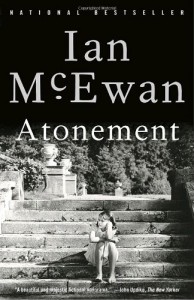Ian McEwan - Atonement

There are two competing novels here. One is driven by a character’s flaw and how it brought her to do a terrible thing. The other is a manipulative, Shawsank Redemption-like tale where the author takes a character who has it made and puts a lot of external troubles on it in order to make us sympathize. Surrounding these novels is some great writing that made you understand why so few authors try minimalism.
There’s no reason to sympethize with Robbie. He has no character. He has no flaw to struggle against. The trouble he faces is all external, and it doesn’t take any effort to just pile terrible events on the character. It’s especially easy to pile on these events, and leave the character almost unscarred to show us how strong and capable he is.
Maybe McEwan wants to inspire me to be good with Robbie’s character, but Robbie needs to have a character first. After being sent to the frontlines because of nothing, Robbie remains humanitarian and nice to everyone. He tries to save a woman and a child, and even a pencil pusher that’s almost being lynched.
Why should he want to save him, though? Robbie ate shit all the way. His only companions aren’t very pleasant. Why shouldn’t anger take the best of him? Soldiers are often angry at ‘pencil pushers’ and office workers. These people make a lot of decisions from behind their desks without seeing the bombings and the fighting. There’s no reason for Robbie to try to save anyone, let alone what soldiers especially despise. There is no depth to this ‘goodness’. It’s a hook to try to make us like Robbie, but that’s exactly what makes him so boring and unappealing.
Only at the end Robbie does something less than admirable, but McEwan doesn’t let all his events reach their logical conclusion. Robbie is barely scarred. All that needs to prevent him from hitting the bottom is some cliched crap about the power of love. Does McEwan thinks that after all Robbie went through, a women’s love is enough? That’s a recipe for cheap escapism.
By never letting Robbie succumb to the logical conclusion of going through hell, he paints a world of black and white. He doesn’t want to. He tries really hard to get to the emotional core of the characters. It’s espceially evident in the small characters and Briony, but all of them deserved so much more than being on a novel where Robbie stars.
Briony is, if not exactly complex, a real character. The deed she tries to atone for comes out of her personality. She does it not just to make the plot move because it’s the reasonable thing to do for a character who lives more inside her head than in the world. Everything else about her stems from this. All her other decisions and actions comes from her character. The end of her story is also consistent with her themes.
It’s almost misandrist how McEwan gives zero depth to the male character while writing Briony so real.
The post-modern Gotcha! at the end doesn’t really redeem this flaw. If anything, it just makes Briony far deeper and Robbie shallower. It’s a twist that serves the story, but it doesn’t excuse spending so many pages with someone with less character than a shovel. It doesn’t excuse the complete lack of even hinting at Robbie is not a saint. I recall how Atwood failed back inThe Blind Assassin. Being sexually attractive is not enough to make a man a saint.
Between these two stories there is a lot of writing. It’s mostly descriptions, but if everyone described like McEwan then it’d make reading so much easier.
McEwan’s greatest prose is found in the middle, writing about the war effort. His attention to small details and every person who passes by is not because it makes it ‘more real’, or to pad the book in attempts to impress. He writes every passer-by like he’s the star of his own novel. Every one of them has his own little short story. They’re so good that you tend to forget Robbie is even there.
It’s so good that the bluntness can be forgiven. McEwan writes like a sledgehammer. He describes everything, and then writes a literary critique of it. This makes Atonement a funny novel. It’s both long and very easy to read. I’d normally attack an author for being that blunt, but it’s deceptive. The emotional insight he shows with the soldiers, both on the frontlines and the hospital contains much more than what he writes.
How an author can fail on what his story focuses and writes beautifully the sidelines is beyond me. Atonement is written by an author of great talent. There’s enough her to enjoy – Briony’s character, the various digressions and descriptions – that it’s easy to forget where McEwan fails. I’m really tired about reading about sexually attractive, righteous and perfect guys whose only troubles are external. It’s not a brilliant novel, but it has plenty of hints of brilliance.
3 nurses out of 5
Also posted in my blog:
https://allcoloursdotorg.wordpress.com/2015/04/01/ian-mcewan-atonement/
 4
4



